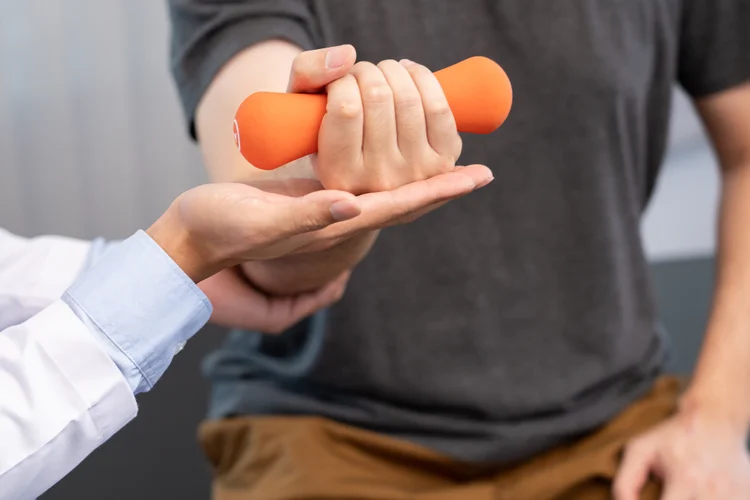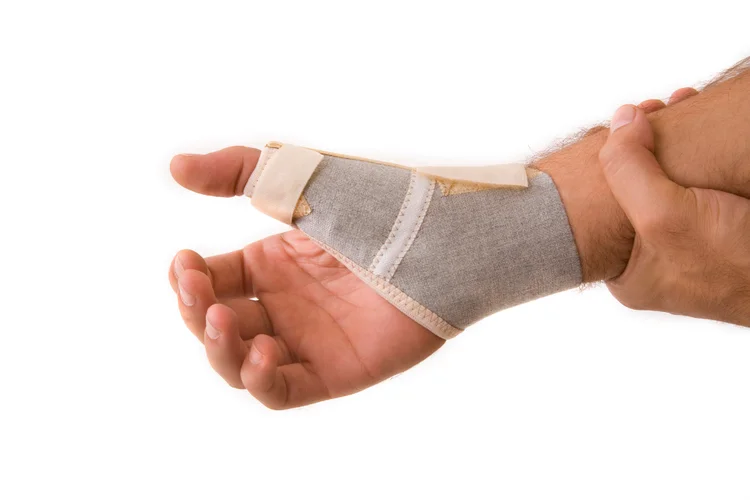Hand Specialist Singapore
Information reviewed by: Dr. Foo Gen Lin | Last updated: Oct 29, 2025
Is hand pain or stiffness affecting your grip or daily tasks? Dr Foo provides focused diagnosis and treatment to restore function and relieve discomfort.
MBBS (University of London) | MMed (Ortho) | FRCSEd (Ortho) | FAMS (Ortho)


What Does a Hand Specialist Do?

A hand specialist diagnoses and treats conditions affecting the hand, wrist, and
forearm, including bone, joint, tendon, nerve, and ligament issues.
At Apex Sports Clinic, our orthopaedic specialists manage a wide range of upper limb
conditions using non-surgical and minimally invasive approaches. We aim to relieve
pain, restore hand function, and support your return to daily life, whether
that involves routine activities, work responsibilities, or participation in sports.
Common Hand and Wrist Conditions We Treat
Hand and wrist issues can result from injury, overuse, nerve compression, or joint degeneration. At Apex, we routinely treat conditions such as:
We also manage sport-specific injuries, repetitive strain conditions, and post-operative rehabilitation needs.
Common Symptoms of Hand & Wrist Conditions
Hand and wrist problems can cause a variety of symptoms that may affect your ability to work, carry out daily tasks, or participate in physical activity.

Common signs to look out for include:
- Numbness or tingling in the fingers, especially during gripping or at night
- Pain in the hand or wrist that worsens with movement or repetitive use
- Stiffness or reduced range of motion in the fingers or wrist
- Weak grip strength or a tendency to drop objects
- Clicking, snapping, or catching sensations in the fingers or wrist
- Visible swelling, lumps, or deformity
Our Approach to Diagnosis and Assessment
At Apex, we believe in a comprehensive approach that combines clinical evaluation with
diagnostic imaging to identify the cause of your symptoms and guide treatment planning.
This may include:
- Detailed physical examination to assess joint movement, tendon gliding, and nerve function
- Functional testing to evaluate grip strength, dexterity, and load tolerance
- Diagnostic ultrasound for real-time imaging of tendons, joints, or cysts
- X-rays to assess for fractures, arthritis, or joint alignment issues
- MRI, if indicated, for detailed evaluation of soft tissue or complex injuries
- Electromyography (EMG) and nerve conduction studies, where necessary, to assess nerve function in cases of suspected compression or neuropathy
Treatment for Hand and Wrist Conditions
Treatment for hand and wrist conditions depend on the nature, severity, and impact of the
condition on your lifestyle or work.
Our approach prioritises conservative management and functional recovery. When
surgery is indicated for more persistent or severe cases, our orthopaedic specialists provide
surgical management as part of a comprehensive care plan.
| Treatment | Description & Purpose |
|---|---|
| Non-Surgical Management | |
| Activity Modification | Adjusting or avoiding repetitive or aggravating activities to reduce stress on the affected structures and prevent symptom progression. |
| Pain Management | Use of oral or topical anti-inflammatory medication to relieve pain and reduce inflammation, particularly in acute flare-ups or degenerative conditions. |
| Splinting or Bracing | Supports and stabilises the hand or wrist to limit movement, reduce pain, and promote healing. |
| Physiotherapy | Structured rehabilitation programme to improve range of motion, grip strength, and functional coordination. Often used for recovery after injury or to manage chronic conditions. |
| Shockwave Therapy (ESWT) | Use of high-energy sound waves to stimulate blood flow, encourage tissue repair, and reduce pain in chronic tendon or soft tissue conditions. |
| Image-guided Injections | Targeted delivery of corticosteroids or platelet-rich plasma (PRP) under ultrasound guidance to reduce inflammation and support recovery. |
| Surgical Intervention | |
| Wrist Arthroscopy |
Minimally invasive procedure using a small camera and surgical instruments to diagnose or
treat conditions.
Commonly used to treat:
|
| Soft Tissue Release Procedures |
Surgical release of constricting structures to relieve pressure on nerves or tendons.
Commonly used to treat:
|
| Ganglion Cyst Excision | Surgical removal of fluid-filled cysts that cause pain, pressure, or functional limitation, particularly when recurrent or unresponsive to aspiration (removal of the fluid using a needle). |
| Tendon Repair |
Reconstruction of torn or lacerated tendons to restore movement and strength, typically
following trauma.
Commonly used to treat:
|
| Fracture Fixation | Internal stabilisation of broken bones using pins, screws, or plates to restore alignment and preserve joint function. |
When Should You See a Hand Specialist?
You should consider seeing a hand specialist if you notice pain, numbness, weakness, or stiffness that limits your function or quality of life.

Prompt evaluation is especially important if:
- Symptoms have persisted for more than two weeks without improvement
- Night-time numbness, tingling, or pain disrupts your sleep
- Grip strength has decreased or you find tasks like opening jars or typing difficult
- You notice a deformity, swelling, or clicking in the wrist or fingers
- There has been recent trauma, fall, or sports injury
- You experience difficulty with fine motor tasks or have concerns about nerve involvement
Cost of Hand Specialist Services in Singapore
| Hand Specialist Services | Estimated Cost (SGD)* |
|---|---|
| Consultation & Assessment | |
| Initial Consultation | From $200 |
| Follow-Up Consultation | From $150 |
| Second Opinion Consultation | From $200 |
| Diagnostic Services | |
| X-Ray | From $100 |
| MRI Scan | From $1,000 |
| Ultrasound Imaging | From $100 |
| Nerve Conduction Study | From $800 |
| Electromyography | From $800 |
| Non-Surgical Treatments | |
| Physiotherapy | From $200 per session |
| Sports Physiotherapy | From $200 per session |
| Shockwave Therapy | From $100 per session |
| Bracing / Casting / Splinting | From $300 |
| Injection-Based Treatments | |
| Cortisone Injection | From $250 per injection |
| Hyaluronic Acid Injection | From $1,000 per injection |
| Joint Aspiration (Arthrocentesis) | From $250 per injection |
| Platelet-Rich Plasma (PRP) Treatment | From $1,000 per injection |
| Ultrasound-Guidance for Injections (in addition to cost of injection) | From $150 |
| Minimally Invasive Surgical Procedures | |
| Debridement (Chondral / Soft Tissue) | From $8,000 |
| Loose Body Removal | From $6,000 |
| Synovectomy | From $6,000 |
| Triangular Fibrocartilage Complex (TFCC) Debridement / Repair | From $10,000 |
| Wrist Ligament Repair – Lunotriquetral / Scapholunate | From $10,000 |
| Traditional / Open Surgical Procedures | |
| Carpal Tunnel Release | From $2,000 |
| Fracture Fixation (ORIF) | From $5,000 |
| Ganglion Cyst Excision | From $3,000 |
| Nerve Repair / Reconstruction – Digital / Median / Ulnar | From $8,000 |
| Soft Tissue Release – Trigger Finger / Contracture | From $2,000 |
| Tendon Repair | From $8,000 |
| Tendon Transfer Surgery | From $8,000 |
| Trigger Finger Release | From $2,000 |
*Prices listed above are estimates and may vary depending on the complexity of the condition, type
of procedure, and other clinical considerations.
For treatments or services not listed above, please contact
us to enquire further.
Finding the Best Hand Specialist in Singapore
Selecting the right hand specialist depends on your condition, treatment goals, and the
level of care you’re comfortable with.
Each person’s symptoms, activity level, and recovery expectations are different, so it’s important
to consider a few key factors:
- Area of Expertise – Some specialists may focus on sports-related injuries, while others manage degenerative joint conditions, nerve compression syndromes, or hand deformities.
- Access to Diagnostic Tools – Imaging such as ultrasound or X-rays can support more comprehensive and timely diagnosis.
- Approach to Treatment – Consider whether the care emphasises conservative options such as physiotherapy, splinting, and injections, with surgery reserved for cases where non-surgical management is not sufficient.
- Rehabilitation Support – Access to integrated hand therapy and follow-up care plays a key role in restoring function and preventing recurrence.
The most suitable hand specialist is one whose clinical experience, treatment approach, and
communication style align with your needs and goals.
If you're unsure where to begin, a consultation can help
you better understand your condition and explore the most appropriate care pathway.
Your hands are essential for almost everything you do. Whether you have carpal tunnel, trigger finger, or another condition, we will work with you to find the right solution.
Find a Hand Specialist Near Me
Apex Novena
admin@apexsportsclinic.sg
101 Irrawaddy Rd, #18-12 Royal Square Medical Centre, Singapore 329565
Nearest MRT: NS20 Novena (3-min walk)
Wheelchair Accessible
Apex East Coast
admin@apexsportsclinic.sg
112 East Coast Rd, #03-03/04 i12 Katong, Singapore 428802
Nearest MRT: TE26 Marine Parade (7-min walk)
Wheelchair Accessible
Why Do Patients Choose Apex Sports Clinic?
Sports Doctor in Singapore: Personalised & Affordable Care
Progressive Treatment Philosophy
We prioritise personalised, non-invasive solutions, progressing to specialised treatments, including surgery, only when needed for more effective and targeted care.
Holistic Patient-Centred Care
From diagnosis to rehabilitation, we provide comprehensive and seamless care for a wide range of orthopaedic conditions.
Specialist in Sports Orthopaedics & Injury Management
We combine expert injury management with a proactive approach to maintaining your body's strength and function, so you can recover fully and perform at your peak.
Patient Journey
1 . Schedule Your Appointment

2 . Expert Diagnosis & Consultation

3 . Customised Treatment Plan

Schedule an Appointment

Our Insurance Partners








Frequently Asked Questions (FAQs)
A hand specialist is typically an orthopaedic doctor or surgeon who is trained to diagnose and treat conditions affecting the hand, wrist, and forearm. This includes injuries, nerve compression syndromes, tendon disorders, and joint degeneration. Depending on the issue, a hand specialist may also collaborate with physiotherapists or hand therapists.
You should see a hand specialist for persistent hand pain to properly diagnose the cause and prevent worsening of the condition. Hand pain may be due to joint, tendon, nerve, or ligament problems, and early assessment supports timely and targeted treatment.
At Apex Sports Clinic, consulting an orthopaedic hand specialist typically involves a clinical evaluation of your symptoms, medical history, and hand function. This may be supported by imaging such as ultrasound or X-rays. Based on the diagnosis, your specialist may recommend a tailored treatment plan, which could include physiotherapy, splinting, injections, or surgery depending on your condition and goals.
A hand specialist can help manage arthritis using approaches such as splinting, physiotherapy, anti-inflammatory medication, or image-guided injections to reduce pain and maintain joint mobility. In more advanced cases, surgery may be considered to improve function or address deformity.
The most appropriate doctor for hand pain is a hand specialist, often an orthopaedic or hand surgeon with focused training in hand and wrist conditions. They are equipped to assess both common and complex problems, ranging from overuse injuries to nerve entrapments and joint disorders.
A hand specialist is typically an orthopaedic surgeon with subspecialty training in hand and upper limb conditions. Some may also be hand and reconstructive microsurgery specialists with a focus on hand surgery. These professionals diagnose and manage a wide range of hand, wrist, and forearm disorders, including tendon injuries, nerve compression, joint degeneration, and trauma.
You should be concerned if you experience persistent pain, numbness, stiffness, weakness, or visible changes in the hand that interfere with daily tasks or progressively worsen. These symptoms may suggest underlying conditions such as nerve compression, arthritis, or tendon injury.
For hand numbness, you should see a hand specialist, typically an orthopaedic or hand surgeon with experience in diagnosing and managing nerve-related conditions. Numbness may arise from problems such as carpal tunnel syndrome or nerve compression and may worsen if left untreated.
Stage 1 early arthritis in the hands involves subtle joint changes, such as occasional stiffness, mild pain during use, or slight swelling, often without visible deformity. Imaging may show minimal cartilage wear. Early intervention through joint protection, activity modification, and conservative care can help slow progression. If you experience such symptoms, it is advisable to seek proper diagnosis and treatment.
Several conditions can begin with hand pain, including osteoarthritis, rheumatoid arthritis, carpal tunnel syndrome, De Quervain’s tenosynovitis, and early-stage tendonitis. In some cases, systemic diseases such as lupus or diabetes-related neuropathy may also affect the hands. If you experience pain that persists, worsens, or interferes with daily activities, it is advisable to consult a hand specialist to determine whether it stems from a local issue or a broader medical condition.
There is no single cure for arthritis in the hands, but treatment focuses on relieving symptoms, preserving function, and slowing progression. Management may include splinting, physiotherapy, anti-inflammatory medication, image-guided injections, or surgery in advanced cases. The appropriate treatment depends on the type and severity of arthritis. It is advisable to consult a hand specialist to determine the most suitable approach for your condition.

